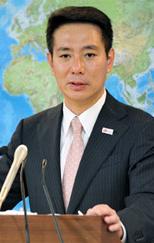|
Diplomacy
Japan-China Dispute Worsens
Saturday, September 18, 2010
 Maehara
Maehara
Tokyo -- The Japan-China dispute which began with the arrest of a Chinese trawler captain near the Senkaku Islands on September 7th has shown no signs of moderating and, in fact, the bilateral atmosphere appears to be becoming more poisonous.
Today was the anniversary of the "Manchurian Incident" of 1931, which marked the first major territorial aggression against Republican China in the run-up to the Pacific War.
Protesters in several cities across China marked the day with anti-Japanese chants and banners.
Outside the Japanese Embassy in Beijing, a group of mostly young protestors held signs saying "Get Out of the Diaoyu Islands!" They also described Captain Zhan Qixiong as a Japanese "hostage."
Heavy rains and efforts by security forces to limit protests, however, kept the groups down to a small size.
Previous to these protests, the Japanese Embassy had notified Japanese tourists and Japanese residing in the country to "be on the alert" and to avoid "provocative actions" when dealing with the Chinese.
Meanwhile, new Foreign Minister Seiji Maehara is showing every indication that he intends to pour oil on the fire. He used his inaugural press conference to restate Tokyo's hard-line view that "no territorial dispute exists in the South China Sea," meaning that he believes that China or Taiwan have no claim whatsoever on the Senkaku (or Diaoyutai) Islands.
Maehara has a past history in which he has publicly described China as a "threat."
He was also, might be added, in charge of the Japan Coast Guard as this whole crisis developed, and thus probably authorized the arrest of the Chinese captain in the first place.
Based on the surveillance of a Maritime Self-Defense Force P-3C patrol plane, Tokyo suspects that China may have brought an excavator to a disputed maritime gas field known as Shirakaba in Japan and Chunxiao in China.
Beijing responded to inquiries from Tokyo that the item in question is not an excavator, but rather repair equipment.
The media in both nations are egging on officials to maintain a hard line.
Japan's Yomiuri Shinbun, for example, editorializes that, "China is mistaken if it thinks Japan will buckle to China's demands if it plays hardball."
Former US Deputy Secretary of State Richard Armitage, on a visit to Tokyo this week, also encouraged his hosts along this line, telling an audience at the Japan National Press Club that China is "testing what they can get away with."
Armitage recommends that Tokyo increase its military budget to send a "signal" to Beijing.
On the other side of the ledger, evidence is growing that Chinese computer hackers may be starting to target Japanese institutions such as the Defense Ministry and the National Police Agency.
Although the hacker attacks appear to be relatively modest so far, Japanese officials are on alert in case they become serious.
PanOrient News
© PanOrient News All Rights Reserved.
|

